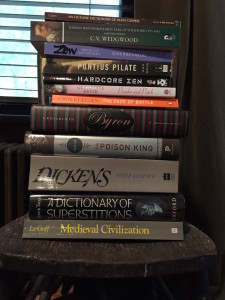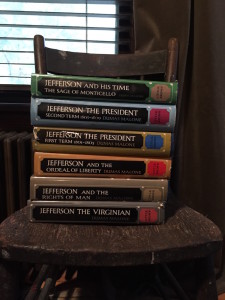
Twice a year, the Friends of the Duncan Library have a book sale; the last two hours of the last day of the sale are $5 per bag. I ask you, what breathing soul could resist such an opportunity?
Jacques Le Goff. Medieval civilization, 400–1500. Let’s all denounce the disparagement of the so-called Dark Ages. It’s a lie! These years were one of the most fertile and inventive periods of European culture — but the Enlightenment needed an enemy to denounce (and that era was another incredible time of reinvention and innovation), so Dark it had to be.
Iona Opie and Moira Tatem. A dictionary of superstitions. Fascinating! People will believe the darnedest nonsense, won’t they? The ones documented here (the book consists almost entirely of quotations, with the occasional commentary) are all European superstitions, and indeed mostly British.
Peter Ackroyd. Dickens. Let me confess here that I actually enjoy Ackroyd’s nonfiction more than his fiction. And, even in his fiction, it’s the parts the he didn’t invent himself that I like best.
Adrienne Mayor. The poison king: The life and legend of Mithradates, Rome’s deadliest enemy. I’d already read a library copy of this, but it costs me nothing to pop it into the bag. Great stuff, this!
Phyllis Grosskurth. Byron: The flawed angel. Perhaps the first international celebrity in the modern mold — he practically invented celebrity single-handed. His wit still bites as sharply as ever. It draws blood.
John Keegan. The face of battle. His A history of warfare is excellent and notable for its unusual sensibility. He neither celebrates nor condemns warfare; he documents its craft.
Georgette Heyer. Powder and patch. I will not call her Regency novels a guilty pleasure. They are all pleasure, unadulterated.
Brad Warner. Hardcore zen: Punk rock, monster movies and the truth about reality. I forget how I came across his blog but I’ve been reading it for years now. To me, one of Zen’s most admirable qualities is its plain pragmatism, and Warner exhibits that same practical lack of pretense in every sentence.
Anne Wroe. Pontius Pilate. I recall reading good reviews of this book when it came out. Also, I couldn’t help but wonder how anyone could spin a book-length biography out of a few sentences in Josephus and the gospels, a handful of ancient coins, and a fragmentary inscription or two.
Philip Kapleau. Zen: The merging of east and west. I found his The three pillars of Zen to be informative and admonitory, even though it seemed to be cobbled together out of odds and ends. This volume is also not so much a book as a congeries, but it extends and enlarges many of the themes of the earlier one.
C.V. Wedgwood. Thomas Wentworth, first Earl of Strafford, 1533–1641: A revaluation. It’s written by Ms. Wedgwood. What more do you need to know? Of course you have to read any book by that most concisely evocative of historians.
William Gates. An outline of dictionary of Maya glyphs. As scholarship, this is hideously outdated. But it’s chockfull of detailed renderings of perhaps the most peculiar and beautiful writing system ever devised.
PLUS! Extra bonus photo!

I snapped up four of the six volumes of Malone Dumas’s magisterial biography of Jefferson at the Duncan book sale. I found the two missing volumes (four and five, as it happens) at the Book Bank, the local used book store, where folks actually care about books instead of treating them as product to move, like so much shampoo or jumbo bags of dog biscuits. I now have about $6 of store credit left from this summer’s grand clearing-out of books that (let’s face it) I was never going to glance at again. What I did with the rest of the store credit is perhaps evident elsewhere here.